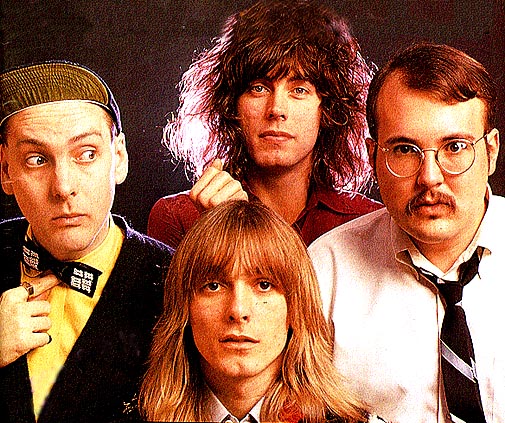There’s a club and you'd like to go
You could meet somebody who really loves you
So you go and you stand on your own
And you leave on your own
Then you go home, and you cry and you want to die
 I think “How Soon Is Now?” plays the same role for the
Smiths that “Alabama Getaway” plays for the Grateful Dead: It’s the favorite
Smiths song for people who don’t really like the Smiths. Most Smiths songs feature the chiming, swirling guitar of Johnny Marr, as opposed to the
wall of electric guitars, centered around a single chord, that he amasses here.
It’s actually a single guitar played back through four different speakers with heavy
vibrato, in addition to the searing slide part, but it sounds like an army. It’s
not like anything else in the band’s catalog.
I think “How Soon Is Now?” plays the same role for the
Smiths that “Alabama Getaway” plays for the Grateful Dead: It’s the favorite
Smiths song for people who don’t really like the Smiths. Most Smiths songs feature the chiming, swirling guitar of Johnny Marr, as opposed to the
wall of electric guitars, centered around a single chord, that he amasses here.
It’s actually a single guitar played back through four different speakers with heavy
vibrato, in addition to the searing slide part, but it sounds like an army. It’s
not like anything else in the band’s catalog.
It's out of step lyrically with much of their catalog too. Morrissey’s lyrics for the band tend to be mordantly
funny – “Please, please, please, let me get what I want/Lord knows, it would be
the first time.” Ain’t nothing funny about “How Soon Is Now?,” which is just chilling, and all too recognizable. The words are more in keeping with Morrissey’s
image as a whiny, self-pitying grandee, although, y’know, the guy is pretty
funny in real life too. Special thanks
to friend of this blog Gavin Edwards for unearthing the following exchange:
Interviewer: Did you hear t.A.T.u's version of
'How Soon Is Now'?
Morrissey:
Yes, it was magnificent. Absolutely. Again, I don't know much about them.
Interviewer:
They're the teenage Russian lesbians.
Morrissey:
Well, aren't we all?
“How Soon Is Now?” was originally the B-side to “William, It
Was Really Nothing,” which puts it in the “Hey Jude”/”Revolution” class of
double-sided singles. The record
company knew what it was doing, though, because when it was eventually released
as its own A-side, it went just to No. 24 on the UK singles chart. Near as I
can tell, the Smiths never even creased the Hot 100 here in the U.S. of A.,
although “How Soon Is Now?” did appear on the U.S. Dance Singles chart.
In my opinion, “How Soon Is Now?” is the band’s crowning achievement,
but the rest of their stuff is pretty fantastic as well, as different as most
of it is. Marr was a singular guitarist with a hugely distinctive sound, and an
incredible composer. As a frontman, Morrissey had personality to burn, and was
simply one of the best lyricists of the day:
Sweetness, sweetness, I
was only joking when I said
I’d like to smash
every tooth in your head
You know what rock & roll doesn’t have enough of? Humor.
Morrissey could be a self-important prig, but being funny makes everything go
down easy.
If there’s one drawback to the Smiths’ candidacy, it’s that
their career was short-lived. "We got on absolutely famously,” Morrissey has said of first starting to work with Marr back in 1982. “We were very similar in drive." Their first single, “Hand in Glove,” came out in May 1983, and the band was incredibly productive for the next four years, issuing four studio albums, a live album, two EPs, and if my counting is right, five non-album singles, all with terrific songs on both sides.
By 1987, they were done with each other. (One biography of the group was rather overdramatically titled The Severed Alliance.) Marr cited,
rather charmingly, Morrissey’s fascination with Cilla Black as the cause of their breakup – he insisted
that a cover of her “Work Is a Four-Letter Word” be the B-side to “Girlfriend
in a Coma.” "That was
the last straw, really,” Marr said. “I didn't form a group to perform Cilla
Black songs."
But in those four years,
they released more quality music than most bands who last two or three times as
long. There was no slack period or decline phase; all their work is worth hearing.
Every other marker is positive: the Smiths’ music remains durable and innovative,
distinctive and eclectic, influencing bands from Oasis to the Shins to Hootie and the Blowfish. It still sounds fresh and engaging, 30 years after it was recorded. I vote YES for the Smiths.
Nothing's changed
I still love you, oh I
still love you
Only slightly, only
slightly less than I used to
My love
 Today, in the final entry in this series, we deal with the case of Cheap Trick. I am sure I don't need to tell you guys about Cheap Trick - the magnetism of Robin Zander, the charisma of Rick Nielsen, and how about the tunes? "I want you to want me!" "The dream police, da da da da da da da!" "Your mama's all right, your daddy's all right, they just seem a little bit weird..."
Today, in the final entry in this series, we deal with the case of Cheap Trick. I am sure I don't need to tell you guys about Cheap Trick - the magnetism of Robin Zander, the charisma of Rick Nielsen, and how about the tunes? "I want you to want me!" "The dream police, da da da da da da da!" "Your mama's all right, your daddy's all right, they just seem a little bit weird..."










:format(jpeg):mode_rgb()/discogs-images/R-4936407-1379943002-3737.jpeg.jpg)